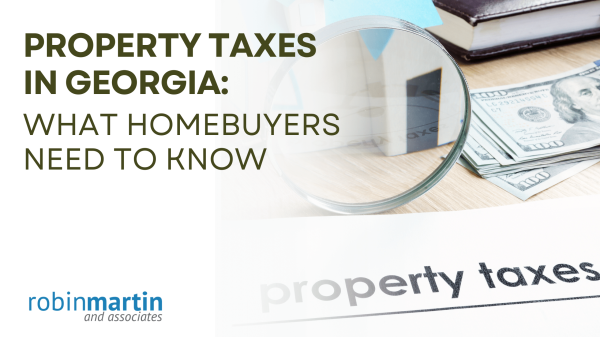property Taxes in Georgia: What Homebuyers Need to Know

Property Taxes in Georgia: What Homebuyers Need to Know
Are you looking to buy a home in Georgia and have questions about property taxes? You’re not alone. Navigating property taxes can be a bit tricky, especially when it comes to understanding how rates are calculated and what exemptions may apply to you. In this article, we’ll break down some of the key factors that could impact the property taxes on your new home.
How Property Taxes Vary
The property tax rate in Georgia can differ significantly, even for homes located side by side. This is due to various factors, including different homestead exemptions, tax assessments, and potential valuation freezes that can make two nearly identical homes have very different tax rates. So, it’s important to fully understand the property tax structure before purchasing your new home and what your rate may be.
Homestead Exemptions: What You Need to Know
If you are planning to buy a home in Georgia and it will be your legal residence as of January 1 of the taxable year, you may be eligible for a homestead exemption. This exemption can reduce the assessed value of your home, which ultimately lowers the property tax burden.
Here are some key details about homestead exemptions in Georgia:
- Standard Homestead Exemption: Homeowners can receive a $2,000 exemption.
- Senior Citizens: If you’re 65 or older, you may qualify for a higher exemption—up to $4,000, depending on your income.
- Additional Exemptions: There are also exemptions available for veterans, disabled veterans, and surviving spouses of U.S. service members, as well as others. Each county may have additional local exemptions as well.
To learn more about homestead exemptions and how to apply, visit your local county tax commissioner’s website. Make sure you’re aware of the filing deadlines, which can vary by county.
How to Estimate Property Taxes by County or City
One useful tool for estimating property taxes in Georgia is SmartAsset. This website provides a quick and easy way to look up tax rates by city and gives you a rough estimate of what your property tax bill might look like.
Additionally, you can access the millage rate for each county. The millage rate is the amount of tax you’ll pay per $1,000 of assessed property value. For example, as of January 2025, the millage rate for Fulton County is 8.87 mills. So, for every $1,000 of assessed value, you’ll pay $8.87 in property taxes.
To find your county’s tax rate visit the County Property Tax Facts page or check your county’s website directly for the most up-to-date information.
A Quick Example: Fulton County Property Tax
Let’s look at a property in Roswell, GA, that is currently valued at $816,000 in fair market value for the current year.
Using the current millage rate of 8.87 mills, your property taxes would be calculated as follows:
- $816,000 x 0.40 (assessed value) = $326,400
- $105,073 Homestead Exemption x 0.00887 = $1,963.17 Estimated Tax
However, there are additional taxes for Fulton Bonds, School Operations, and Roswell City that increase the property tax bill to $7,616.97, for an effective property tax rate of 0.93% of the assessed value.
For more information on property taxes and the specifics of a property or your new home, check out your local county’s tax office website. Typically, you can easily find the latest property tax bill there.
The above information is deemed reliable, but there may be errors, and state and county property tax rates and laws are likely to change.